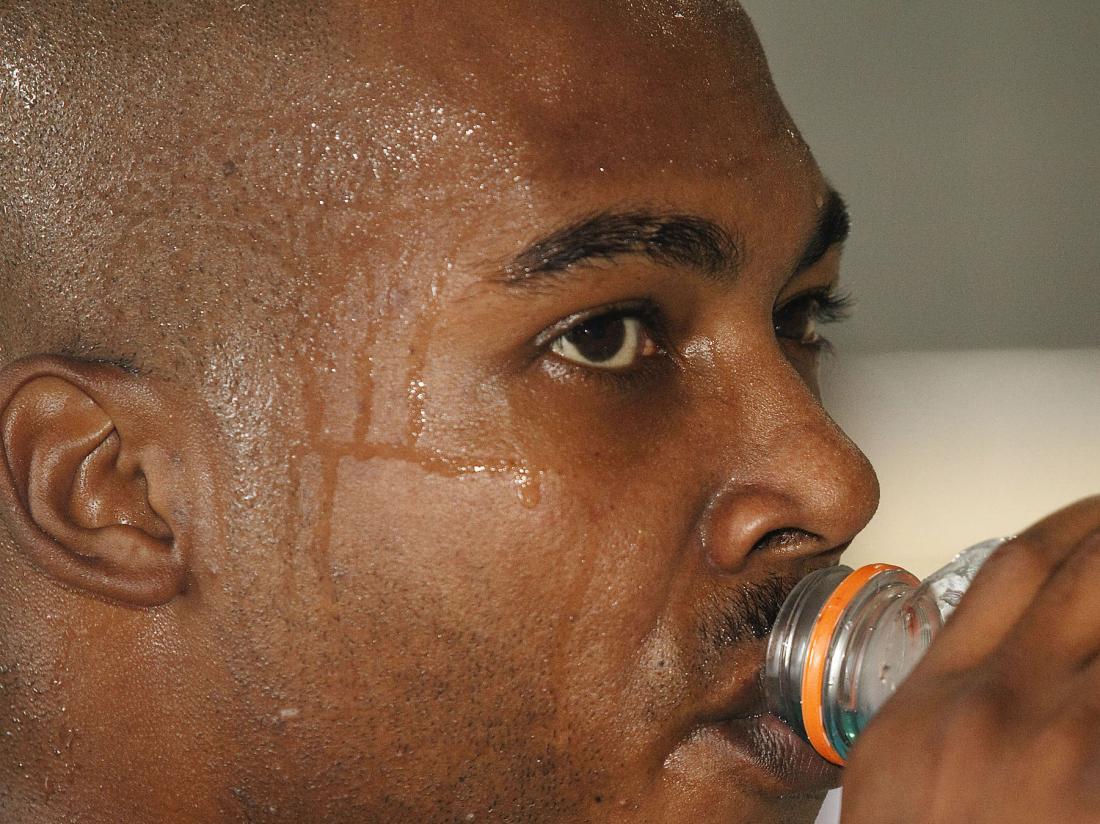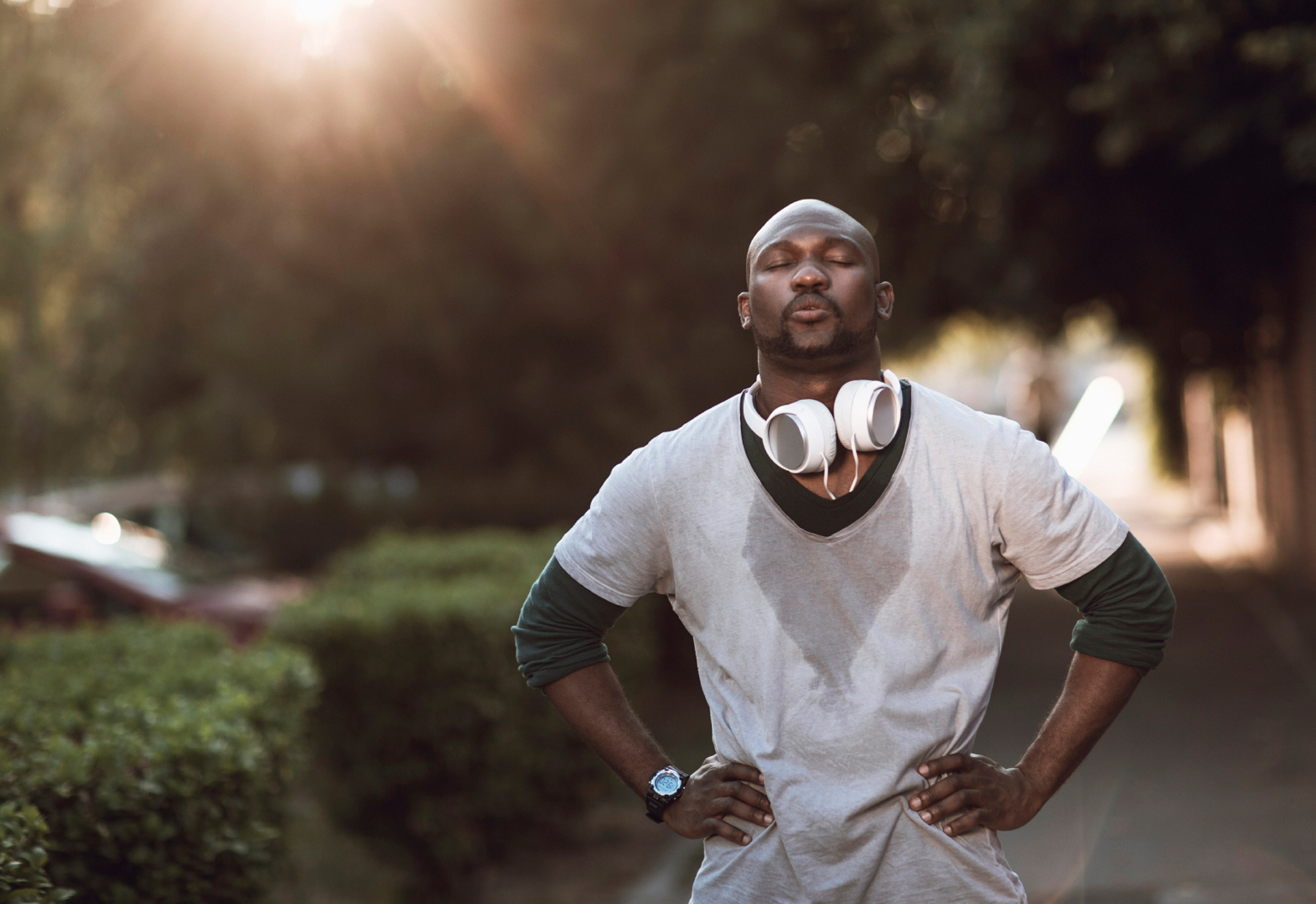
Sweats are things we can’t do without as humans. However, the smell that comes with it can be disturbing and nauseating. What are the causes and how can we combat it? Read up and learn…
· Composed of about 99 percent water, sweat evaporates on the skin’s surface, cooling the body and keeping it from overheating.
· Sweat secretions help you in other ways, too. They include dermcidin, an antibiotic peptide that appears to regulate bacteria growth on the skin and may fight infection.
· Not all humans sweat equally. Men sweat up to twice as much as women, and both sexes sweat less with age.
· The sensation of touch can trigger a “sweat reflex” on the opposite side of the body from the spot that is touched.
· Sweat can trigger other responses: People with atopic dermatitis, a skin condition, can experience an immediate and serious allergic reaction to a fungal protein called MGL_1304 that’s found in sweat.
· Aside from humans, horses are one of the few mammals that thermo-regulate by sweating. Horse sweat is high in latherin, a protein that helps the water in sweat travel from the skin, past the animals’ heavy waterproof pelt and to the air, where it can evaporate and keep them cool.
· Hippos actually produce a red-colored sweat, which acts as an antibiotic and sunscreen.
· If you’re sweating red and you’re not a hippo, you might have a rare condition called hematohidrosis. Blood vessels rupture and run into sweat glands in affected individuals, causing them to actually sweat blood.

· Another rare condition, chromhidrosis, causes humans to sweat orange, blue or other colors. While the condition can sometimes be traced to ingesting certain drugs, the cause often remains a mystery in otherwise healthy people.
· It’s no mystery, however, why the sweat of healthy people often smells different from that of sick individuals. The body emits volatile organic compounds based on metabolic condition, which can change when disease or infection is present.
· Cystic fibrosis can be detected with a sweat test. Sodium and chloride are much more concentrated in the sweat of individuals with the condition.
· Emotions can trigger changes in the composition of your sweat. In an Austrian study, participants wore pads that collected their sweat while watching scary films first, and then neutral films the next day. A second group of volunteers smelled the pads and was able to distinguish which pads were worn during the scary movie.
· In a similar experiment, female participants judged the sweat of non-meat-eating men to be more attractive than that of meat eaters.
· Regardless of your health, feelings or diet, your sweat is distinctly yours. While other components of sweat may fluctuate, an individual’s sweat “fingerprint,” a unique blend of 373 volatile compounds, remains consistent over time.

· Each of us has a unique sweat fingerprint, but the two types of sweat glands, apocrine and eccrine, are universal to humans. We have eccrine glands over most of our bodies, but apocrine glands only in our armpits and genital region.
· Our bodies produce very little apocrine perspiration, but it’s responsible for most of the odor because it’s high in water and waste products that promote the growth of smelly bacteria.
· Clear, fluid eccrine sweat, produced in much larger quantities, spreads the apocrine over a larger surface area — and the stench along with it.
· What to do with all that sweat? UNICEF and Swedish engineer Andreas Hammar teamed up in 2013 to draw attention to millions of people without clean drinking water by creating the Sweat Machine, which pulled sweat from clothing and turned it into potable water through a process of spinning, heating and filtering.
· The Sweat Machine was more awareness-raising stunt than solution. A sweaty T-shirt yielded just 2 teaspoons of purified water, and organizers admitted there were no plans to mass-produce the gizmo.
· Maybe the Sweat Machine would have been more productive if they’d used socks instead. A pair of human feet has 250,000 sweat glands, emitting a half pint of liquid every day.

· Everyone has between 2 and 5 million sweat glands spread across the body.
· The fitter you are, the sooner you may start to sweat during exercise. This is because your body recognizes the need to cool you off faster so you can work out longer.
· Women have more sweat glands than men, but men’s sweat glands actually produce more sweat than women’s.
· It’s possible to sweat too much. Overactive sweat glands (also known as hyperhidrosis) can be caused by certain medications or medical conditions. Hyperhidrosis can be embarrassing to deal with and can even lead to dehydration.
· Some people have salty sweat. If your sweat stings your eyes or stings if it trickles into a cut, tastes salty or leaves white streaks on your skin or clothes after exercising, you're a salty sweater. If you frequently notice a salt-like substance on your clothes after you sweat, talk to a doctor – you could have a salt imbalance.
· During intense exercise in the heat, athletes can sweat off 2 to 6 percent of their body weight.
· There is a difference between stress sweat and regular sweat. Regular sweat is comprised of water, salt and potassium, and helps cool the body down as it evaporates. Stress sweat is released by a different gland and is comprised of fatty acids and proteins. Stress sweat doesn’t evaporate as quickly as regular sweat and can develop an odor when it combines with bacteria on the skin.

· The normal human being sweats around 278 gallons EACH year.
· An estimated 360 million people worldwide suffer from “extreme” sweating.
· cows sweat through their noses
· Your feet have OVER 250,000 sweat glands.
· Horses have armpits that sweat like humans.
· Swedish scientist have created a delicious beverage machine that dispenses freshly secreted sweat.
· Vegetarians have better smelling sweat.
· Sweat is in fact odourless. An odour is created when it reacts with certain bacteria that are on your skin.
· Sweat is colourless. Those yellow stains that appear on your shirts are in fact caused by a reaction with chemicals in your antiperspirants.
· Sweating doesn’t make you lose weight. Sweat is only made up of water, salt and protein, so once you take a drink to rehydrate the weight lost from sweat will return.

· There is such a thing as sweating too much. This is known as hyperhidrosis, it is a medical condition that almost two million people suffer with in the UK alone.
· The most concentrated area of sweat glands is on the bottom of your feet, while the least is on your back. The reason you feel your underarms sweat so much is because the area isn’t very ventilated, making it difficult for sweat to evaporate.
· Certain foods can make you sweat more. This can be because they increase your metabolism which, in turn, increases your body temperature resulting in your body producing sweat to cool you down.
· The only areas of your body that do not have sweat glands are your ears, lips and nails.
· Like your fingerprint, body odour (otherwise known as BO), is unique to every individual.
· Your sweat feeds whole colonies of bacteria that call your body home.

· All that body odor you associate with sweat is really just the noxious waste produced by those bacterial feasts.
· You should be pretty pumped about sweat. It keeps us alive and helped us evolve into the stinky creatures we are today.
· Human sweat contains 1% salt. It doesn't sound like much but it is about the equivalent of half a teaspoon of salt in 1 glass of water.
· Some people begin to sweat when they eat, especially spicy food. This is called gustatory hyperhidrosis. Sweating usually occurs in the face, neck and scalp. Some folks will even begin to perspire just smelling or thinking of food.
· Not sweating enough is called anhydrosis. This can actually be dangerous because the body can overheat and damage vital organs. It can even be fatal.
· The faster you sweat, the saltier your sweat will be. As sweat travels up the sweat gland, some salt or sodium is reabsorbed by the sweat gland. If the sweat moves quickly, the sweat gland will have less time to reabsorb the sodium and the sweat reaching the surface of the skin will be saltier.
· Sweating helps us keep cool. Storks and vultures cool off by pooping on their legs. Because bird poop is mostly liquid, as it dries on the birds' legs, heat is carried away, bringing down their body temperature.
· One tiny sweat gland produces about 10 billionth of a liter of sweat per minute. Doesn't sound like much but remember sweat glands are really small. At that rate it would take one sweat gland about 5 weeks to fill one teaspoon.

· Foods like garlic, onions, or cabbage may worsen body odor. As byproducts of certain foods are secreted, they interact with the bacteria on our skin, causing a foul-smelling odor. High levels of sulfur in foods like garlic and onions can cause this. A diet high in cruciferous vegetables — like cabbage, broccoli, and Brussel sprouts — may also change your body odor thanks to the sulfur they contain as well.
· Red meat may make your smell less attractive.
· Antiperspirants stop you from sweating, deodorant masks your smell.
· For left-handed men, your dominant armpit may smell more ‘masculine’.
· You can emit a scent of happiness through sweat


No comments:
Post a Comment